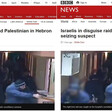Media Watch 23 December 2014

Palestinians carry a protester wounded by Israeli fire during a demonstration in the northern Gaza Strip on 5 December.
APA imagesLast month, the BBC sent an email to the UK-based campaigning organization Palestine Solidarity Campaign (PSC) which was almost comical in its arrogance.
It was a response to a complaint made by PSC in October that BBC online reports were referring to the Gaza ceasefire as holding, despite the fact that by the end of October, Israel had breached the ceasefire numerous times since it was signed on 26 August.
In fact, Israel has fired on Palestinians in Gaza almost on a daily basis.
In its initial complaint, PSC referred to the website of the Palestinian Centre for Human Rights (PCHR), which documents incidents of ceasefire breaches. These breaches had been collated in an article published by Middle East Monitor (MEMO), which reported that there was more than one Israeli attack on Gaza every day in September. The MEMO article was also included in PSC’s submission.
At the beginning of November, the BBC emailed to say: “You direct us to a non-BBC online report as evidence that the ceasefire has been violated by Israel. While we will not comment on the content or accuracy of what is published elsewhere, we would assure you that we are committed to due impartiality in respect of all our news reports and we are careful that this is maintained.”
There is more than a touch of Kafka about the first sentence of the BBC’s response, which seems to be suggesting that if anyone wants to prove that the ceasefire has been broken, and the BBC is wrong to say it is holding, then the proof that it has been broken must come from a BBC report — a report which doesn’t exist — as the BBC will not accept “a non-BBC online report as evidence.”
Laughable arrogance
And why won’t the BBC accept non-BBC reports as evidence that Israel has been continually violating the August truce? Because, as the email’s second sentence indicates, the BBC feels it can’t trust the veracity of any news or factual sources other than its own, not even the reports of PCHR.
And there’s the laughable arrogance of a news organization which apparently sees only itself as a trustworthy source of news and yet, as The Electronic Intifada exposed in October, produces maps so wildly inaccurate that they place Jerusalem entirely within Israel, even though under international law the eastern part of the city, occupied by Israel in 1967, is part of the West Bank.
A news organization which places such little value on accurate reporting that its governing body, the BBC Trust, has ruled that BBC journalists can refer to Jerusalem as a wholly Israeli city because Israel has “de facto control over the entire city in a political, administrative and military sense.”
It’s a news organization, which while seemingly saying it can’t trust MEMO or the fact-collecting of PCHR, can’t get its own news reports right.
It defends its senior presenters such as Martha Kearney, of Radio Four’s World at One, when they falsely report that Israeli soldiers were killed on the same day that Rachel Corrie was crushed by an Israeli bulldozer in Gaza, and only admits to false reporting after seven months of twisting and turning in an attempt to justify Kearney’s erroneous remarks.
This is a news organization which bends so far away from accurate reporting on Palestine and bows towards an Israeli viewpoint instead, that it even tries to blur the line on the occupation of Gaza and additionally tells its journalists to downplay the siege.
As The Electronic Intifada revealed last year, the BBC’s Online Middle East editor Raffi Berg sent an internal email to BBC journalists asking them to minimize Israel’s siege on Gaza in their reporting. The leaked emails were quickly posted, with approving comments, on a pro-Israel website.
Gaza occupation “debatable”
And, in correspondence seen by PSC, senior BBC executive Richard Hutt questions whether Gaza is occupied, citing the argument that Israel disputes the fact of its occupation.
In an email to a viewer, sent in July 2013, Hutt writes: “It is fair to say that the question of whether Gaza is currently occupied is the matter of some debate.”
He adds that the Israeli government believes “the unilateral withdrawal and the absence of a military presence or Israeli settlers in the area means that it cannot be considered occupied,” and therefore the BBC cannot state categorically that Gaza is occupied territory.
This is despite the UN’s clearly stated position, accepted by the UK government, that Israel is the “occupying power” in Gaza. Likewise, The International Committee of the Red Cross still calls Gaza part of the “occupied territories” because it defines “occupation” as “effective control” over a territory.
Late last Friday night, Israel carried out air strikes in Gaza – the first aerial bombing since the truce. Previous ceasefire breaches – those carried out while the BBC was claiming the ceasefire was holding — had involved Israeli gunboats firing at fishermen and ground attacks against civilians.
BBC Online reported Friday’s air strikes and quoted a statement from the Israeli army which, predictably, claimed they were “in response” to a rocket fired from Gaza.
And yet the reality is that the air strikes were actually a massive escalation of Israel’s continuous attacks on Gaza since the truce was signed, rather than a simple “response” to a rocket.
But when the BBC, through September, October and most of November, reports that the ceasefire is holding, how can its audiences have any idea of that reality? When it fails to report that on Friday afternoon, hours before Israel dropped its missiles on Gaza, Israeli soldiers had shot and wounded six Palestinians in the north of the Strip, why should its audiences not believe that the air strikes were, as the BBC reports, a “response” to seemingly unprovoked Palestinian aggression?
Through misreporting and non-reporting, the BBC presents a thoroughly inaccurate picture of Israel’s occupation of Palestinian land. And yet it remains smug enough to cast doubt on “the accuracy of what is published elsewhere.” The arrogance is comical, yes, but also deeply disturbing.






Comments
Use voting power and boycott?
Permalink Martin O'Brien replied on
Thanks to PSC, EI and Amena Saleem, we have here yet more evidence that the BBC is complicit in genocide and oppression. It is also guilty of treason against its own nation; because every time that it undermines International Law through its misreporting and so helps violations of International Law, it simultaneously undermines the right of its own people, if it should ever be under oppression or faced with genocide, to claim the protection of this same International Law.
British citizens who care about justice and a decent future for their families CAN do something about this despicable body and the dangerous situation that it is helping to continue and aggravate. They can, for example, tell all their prospective MPs for the next general election that they will not give them their vote unless they agree to bring in immediate legislation enabling any listener or viewer to call the BBC to immediate account for any biased, inadequate, inaccurate or otherwise unacceptable reporting, under threat of immediate fines and/or other sanctions. Of course, this will lead to frivolous and twisted complaints, from the Zionist lobby, for example. But knowledgeable and firm judges will quickly make clear that irresponsible complaints will get nowhere fast. Boycott: the BBC must make millions of pounds each year on sales of its books, for example on cookery, and its DVDs. We could make it clear to the BBC that we will certainly be listening to and watching its news coverage but certainly not watching or buying its books or DVDs when it comes to its comedy series, Downton Abbey, Match of the Day, etc., etc. Actually to deprive oneself of many of these pleasures will need a lot of self-sacrifice, but self-sacrifice is part of the price each of us has to pay when things that we like happen to be provided by smooth-talking but ruthless criminals.
BBC
Permalink Sean Farley replied on
Well said.
BBC's Kafkaesque Response Complaint...
Permalink Jeff Bennett replied on
First rule of thumb when trying to determine the truth about an article covering Israeli behavior: Read the article, note the quotes by Israeli spokesperson(s), and believe the exact opposite.
Spread the truth
Permalink Steve replied on
Haven't been able to stomach watching the BBC in years. When I am traveling or at a restaurant and catch glimpses of BBC it amazes me that they still have a single viewer. It is very strange and obvious how they create a dumb down version of any incident and apply there political slant so heavy. I would assume only a small population of simple minded people actually watch it at all.
BBC
Permalink Ian replied on
Well the "good news" is that by the BBC's own definition while they dispute that Gaza is occupied they must full therefore accept that the West Bank is "occupied". But the fact that Gaza is fully blockaded by air and sea and incursions by the IDF happen almost daily, apparently means little to the BBC.
The standards of the BBC has fallen steadily. Instead of good understandable British accents the reporters now almost always speak a myriad of English dialects which are often quite difficult for people to understand, especially if English is not their mother tongue. Obviously the BBC overseas service is first and foremost directed at native British people these days and not people spread far and wide with less than great English skills for whom local accent are quite confusing at best.
In reporting of incidents in the USA the BBC often makes factual errors. In the recent case of Eric Garner in NYC they almost always refer to him dying while being held down by police on the streets. In reality he died rather later of a heart attack. One can argue what caused the heart attack, but he most definitely did not die while being arrested.
These might all be considered "small points", but reporting with significant omissions and without due care for true facts adically changes the perspective of the listener, or reader, especially if they are accepting BBC reporting as the most accurate available.
In years gone by the BBC was considered the most balanced and neutral of sources and the most factual and easy to understand. Sadly that accuracy is most often missing these days and the BBC is not as easy to listen to by its wide audience overseas.
Thank you Amena for helping
Permalink Samy replied on
Thank you Amena for helping us to discover the truth about what's going in Palestine. Shame on the corporate media for all their lies ! I will never trust them again